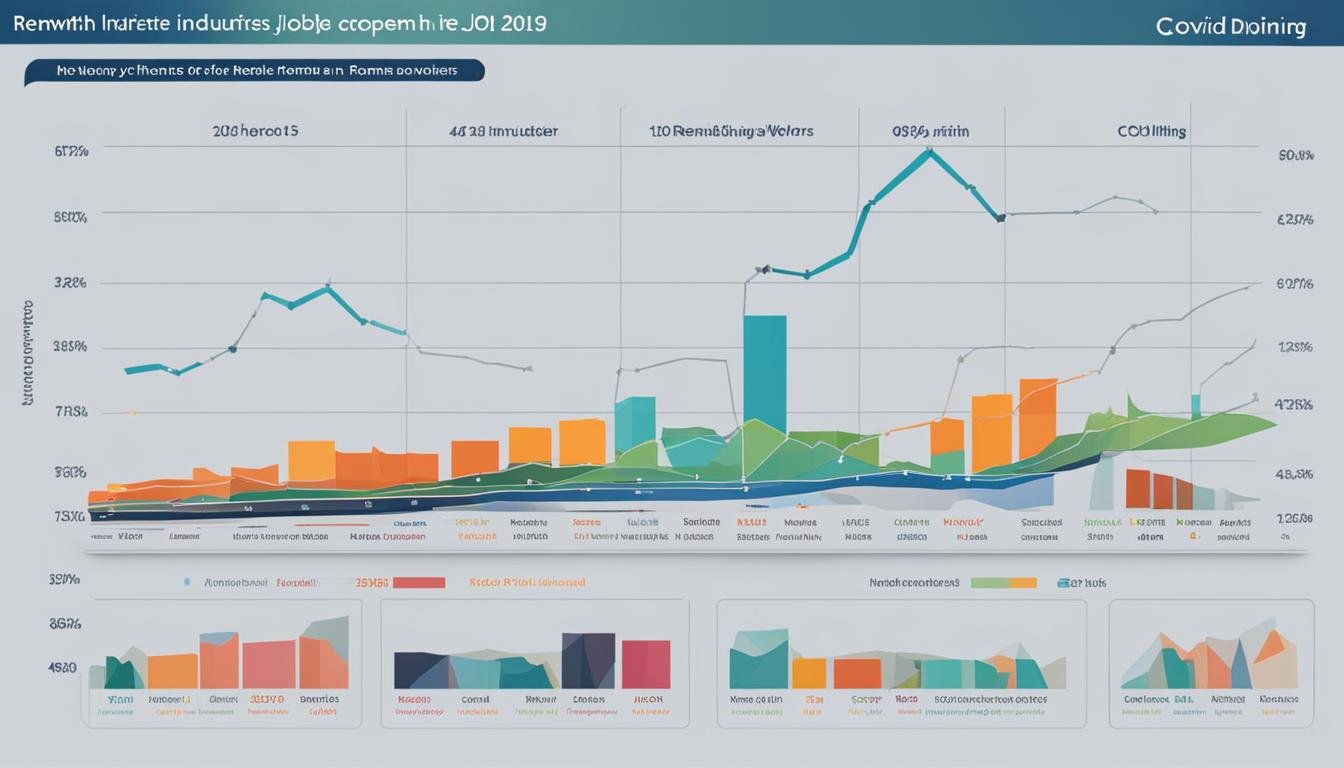The remote job market is rapidly evolving, with more and more individuals and organizations embracing the benefits of remote work. As the workforce becomes increasingly mobile and connected, it is important to understand the key statistics and trends shaping the remote job market. In this article, we will delve into the data and insights surrounding remote work, providing you with valuable information to navigate this growing industry.
Remote work is not just a passing trend; it is a significant shift in the way we work and live. The demand for remote job opportunities is on the rise, as professionals seek flexibility, work-life balance, and the freedom to work from anywhere. Employers are also recognizing the benefits of remote work, such as increased productivity and access to a broader talent pool.
Key Takeaways:
- The remote job market is expanding rapidly, driven by the desire for flexibility and work-life balance.
- Remote work offers numerous benefits for both employees and employers, including increased productivity and access to a wider talent pool.
- Understanding the statistics and trends in the remote job market is vital for individuals and organizations looking to capitalize on this growing industry.
- Remote work is here to stay, and its impact on the future of work will continue to shape the job market in the coming years.
- Stay tuned as we explore further insights into remote work, including its impact on the environment, real estate market, and the challenges and preferences associated with remote work.
Impact of Remote Work on the Future of Work
Remote work has revolutionized the way we think about the future of work. With 8 in 10 people currently working in a hybrid or remote capacity, it’s clear that this trend is here to stay. According to a Gallup survey, this number is expected to continue growing in the next 12 months.
Despite the proven benefits of remote work, such as increased productivity and improved work-life balance, some managers still have reservations about fully embracing it. However, the statistics tell a different story. In fact, a staggering 63% of professionals consider remote work to be the most important aspect of their job, as reported by FlexJobs.
Why is remote work becoming such a crucial factor in the way we work? The answer lies in its impact on both employees and employers. For employees, remote work offers flexibility, autonomy, and the ability to work from anywhere. This newfound freedom allows individuals to prioritize their work-life balance and take control of their schedules.
From an employer’s perspective, remote work has the potential to attract top talent from anywhere in the world. It eliminates geographical barriers, widens the talent pool, and reduces recruitment costs. Furthermore, studies have shown that remote workers are often more productive and motivated, leading to cost savings and increased profitability for businesses.
“Remote work has truly transformed the way we work, bringing about a paradigm shift in the traditional office culture. It has become an integral part of the future of work, offering countless benefits for both employees and employers.”
As remote work continues to shape the future of work, it is vital for organizations to adapt and embrace this new way of operating. By doing so, they can unlock the full potential of their workforce and position themselves for success in an increasingly remote world. The tables have turned, and remote work is no longer just a perk; it’s a necessity for businesses looking to thrive in the modern era.
Benefits of Remote Work
Remote work offers numerous benefits for both employees and employers. Studies have shown that remote workers are often more productive and experience better work-life balance. Additionally, remote work has a positive impact on mental and physical health, reducing stress levels and improving overall well-being.
One of the key benefits of remote work is the increased productivity it brings. Without the distractions and interruptions commonly found in a traditional office setting, remote workers are able to focus more effectively on their tasks. This enhanced productivity often leads to greater efficiency and better quality work.
Remote work also allows for better work-life balance. With the flexibility to create their own schedules, remote workers can better manage their personal and professional commitments. This freedom to align work with personal priorities leads to reduced stress levels and improved overall well-being.
“Remote work provides me with the opportunity to achieve a healthy work-life balance without compromising on my professional growth. It allows me to be present for my family while also excelling in my career.” – Emily, Remote Worker
Mental and physical health is another area where remote work shines. Working from the comfort of home eliminates the stress and fatigue associated with commuting, resulting in improved mental well-being. Moreover, remote work provides flexibility for individuals to incorporate exercise and self-care into their daily routine, leading to better physical health.
Financial benefits are also associated with remote work. Remote workers can save on expenses such as commuting costs, work attire, and eating out during lunch breaks. This not only contributes to personal financial wellbeing but also reduces the environmental impact of transportation.
Overall, remote work offers a wealth of benefits, ranging from increased productivity and improved work-life balance to enhanced mental and physical health. Let’s explore the multitude of advantages remote work brings to individuals and organizations.
Environmental Impact of Remote Work
Remote work not only benefits employees and employers, but it also has a positive impact on the environment. By reducing the need for commuting, remote work leads to a significant decrease in traffic congestion and air pollution. This shift towards remote work has had tangible environmental benefits, including a reduction in greenhouse gas emissions.
According to recent studies, when 3.9 million employees work from home at least half of the time, it is equivalent to taking more than 600,000 cars off the road for a year. This reduction in carbon emissions plays a vital role in combating climate change and improving air quality. Furthermore, remote work encourages the adoption of environmentally friendly practices that contribute to sustainability.
One notable example is the decrease in paper usage. In a traditional office setting, paper consumption is often high, leading to deforestation and increased waste. However, remote work promotes a digital-first approach, reducing the need for paper documents and printing. By embracing remote work, individuals and companies can minimize their environmental footprint.
“The transition to remote work has resulted in a significant reduction in greenhouse gas emissions and has the potential to create a more sustainable future.”
Additionally, remote work contributes to energy conservation. With fewer employees present in office buildings, there is reduced energy consumption for heating, cooling, and lighting. This reduced energy usage not only benefits the environment but also leads to cost savings for businesses.
Overall, the environmental impact of remote work is undeniable. It promotes a greener and more sustainable way of working, reducing carbon emissions, paper waste, and energy consumption. By embracing remote work, individuals and organizations are making a positive contribution to a more environmentally friendly future.
Key Points:
- Remote work reduces traffic congestion and air pollution caused by commuting.
- When 3.9 million employees work from home at least half the time, it reduces greenhouse gas emissions by the equivalent of taking more than 600,000 cars off the road for a year.
- Remote work promotes environmentally friendly practices such as using less paper and reducing energy consumption.
- Energy consumption for heating, cooling, and lighting is reduced in office buildings with fewer employees present.
Remote Work in Different States
When it comes to remote work, the landscape differs across states. Factors such as internet access, cost of living, and home square footage play a significant role in determining the best states for remote work. According to WalletHub, some states offer more favorable conditions for remote work than others.
Here are the top states for remote work:
| State | Ranking |
|---|---|
| Delaware | 1 |
| Utah | 2 |
| Maryland | 3 |
| Connecticut | 4 |
| New Jersey | 5 |
| District of Columbia | 6 |
These states have created an environment that is conducive to remote work, offering infrastructure, resources, and support systems that cater to remote workers’ needs.
Delaware, Utah, Maryland, Connecticut, New Jersey, and the District of Columbia have embraced the remote work culture and provide the necessary conditions for professionals to thrive in their remote roles. From robust internet connectivity to affordable living options and suitable home setups, these states offer the ideal environment for remote work.
Remote Work and Real Estate
Remote work has revolutionized the way people choose their living arrangements, consequently impacting the real estate market. With the freedom to work from anywhere, remote workers are opting for locations that offer a lower cost of living and a better quality of life. This shift in preference has expanded the range of real estate options available to remote workers, from bustling urban centers to serene suburban neighborhoods and picturesque rural areas.
One of the significant implications of remote work on the housing market is the potential impact on urban centers. Traditionally, people have chosen to live near their workplaces for convenience and reduced commuting times. However, remote work has eliminated the need to be geographically close to one’s job. As a result, we may witness a decrease in demand for housing in crowded city centers and an increased focus on properties outside these areas.
This trend opens up new opportunities for real estate developers and investors. It’s not just about offering spacious homes or affordable prices; it’s also about considering the amenities and lifestyle preferences that appeal to remote workers. Properties located in areas with good infrastructure, access to outdoor recreational activities, and a strong sense of community are likely to attract remote workers seeking an ideal work-life balance.
The emerging trend of remote work also brings attention to the concept of co-living spaces and shared housing options. As remote workers explore alternative living arrangements, co-living communities that offer shared living spaces, well-designed work areas, and opportunities for social interaction may become a popular choice.
Overall, remote work has created an exciting shift in the real estate landscape. As more individuals embrace flexible work arrangements, the housing market will continue to adapt to their changing needs and preferences. Whether it’s a spacious suburban home, a cozy countryside retreat, or a vibrant co-living community, the real estate industry has an opportunity to cater to the evolving demands of remote workers and shape the future of housing.
Challenges of Remote Work
While remote work offers many benefits, it also presents challenges that remote workers must navigate. Being aware of these challenges and finding effective strategies to overcome them is essential for a successful remote work experience.
Feelings of Isolation
One of the primary challenges remote workers face is a sense of isolation. Working from home or remotely can lead to feelings of loneliness and disconnection from colleagues and the wider work community. Without the daily interactions and social engagements that an office environment provides, remote workers may miss out on the camaraderie and support that comes with working in a traditional setting.
“Working remotely can sometimes feel isolating, especially when you’re used to working in a bustling office environment. It’s important to find ways to stay connected and build relationships with colleagues, even from a distance.”
Difficulty in Maintaining Work-Life Boundaries
Another challenge of remote work is the blurring of boundaries between work and personal life. When your office is at home, it can be challenging to separate work responsibilities from personal obligations. Without clear boundaries, it’s easy to find yourself working longer hours, experiencing burnout, and struggling to find a healthy work-life balance.
“Setting clear boundaries between work and personal life is crucial when working remotely. Establish a dedicated workspace, create a schedule, and stick to it as much as possible. Remember to prioritize self-care and give yourself permission to disconnect from work when your workday is over.”
Technological Issues
Technology is an essential component of remote work, but it can also be a source of frustration and challenges. From unreliable internet connections to software glitches, technological issues can disrupt productivity and cause stress for remote workers.
“Remote work heavily relies on technology, and it’s important to be prepared for potential issues. Invest in reliable internet service, ensure you have backup plans in case of connectivity problems, and stay up to date with software updates to minimize technological challenges.”
By acknowledging and addressing these challenges, remote workers can find ways to navigate them effectively and create a fulfilling and successful remote work experience.
| Challenges of Remote Work | Strategies to Overcome |
|---|---|
| Feelings of Isolation | 1. Schedule regular virtual team meetings 2. Participate in online communities or professional networks 3. Find local co-working spaces or join shared office spaces |
| Difficulty in Maintaining Work-Life Boundaries | 1. Set clear work hours and stick to them 2. Establish a designated workspace 3. Practice self-discipline and prioritize self-care |
| Technological Issues | 1. Invest in reliable internet and backup solutions 2. Stay informed about software updates and troubleshoot common issues 3. Have a contingency plan for technology failures |
Remote Work Preferences
When it comes to remote work, it’s clear that employees have a strong preference for this flexible working arrangement. In fact, 98% of workers express a desire for some form of remote work. This sentiment is backed by surveys and studies that highlight the numerous benefits of remote work.
One of the key advantages of remote work is its positive impact on work-life balance. Remote workers have the flexibility to manage their personal and professional responsibilities more effectively, leading to greater satisfaction and overall well-being. This increased balance allows individuals to prioritize their health, family, and personal interests.
“Remote work has been a game-changer for me. I can now spend more time with my family, pursue my hobbies, and still excel in my career.”
In addition to work-life balance, remote work has been shown to enhance productivity. With the freedom to set up their own work environment and schedule, employees often feel more motivated and focused on their tasks. This increased productivity benefits both individuals and organizations, leading to more efficient workflows and greater output.
The positive impact of remote work extends beyond work-life balance and productivity. Surveys have also indicated that remote work has a significant effect on mental health. By reducing the stress associated with commuting and providing a more flexible and comfortable work environment, remote work can improve overall mental well-being.
While remote work is highly preferred, there is also a growing interest in hybrid work arrangements. These arrangements combine remote and in-office work, allowing employees to enjoy the benefits of both worlds. With a hybrid approach, individuals can maintain face-to-face interactions and collaboration, while still enjoying the flexibility and autonomy that remote work offers.
Ultimately, remote work preferences indicate a strong desire for work arrangements that prioritize flexibility, well-being, and productivity. Whether it’s full-time remote work or a hybrid model, organizations that embrace and accommodate these preferences are likely to attract and retain top talent in the evolving job market.
Sources:
- Gallup Survey, 2021
- FlexJobs Remote Work Statistics
- Survey on Remote Work and Employee Satisfaction, 2020
Conclusion
After conducting a comprehensive remote job market analysis, it is evident that remote work has emerged as a major trend, with a growing number of individuals embracing this flexible way of working. Numerous studies and surveys have consistently highlighted the numerous benefits of remote work, ranging from increased productivity and improved work-life balance to a positive environmental impact.
As the job market continues to evolve, it is expected that remote work will remain a prevalent and valuable option for both employees and employers. The insights gained from this analysis provide valuable information for individuals seeking remote job opportunities and organizations looking to implement remote work policies.
With the ongoing advancements in technology and the proven success of remote work, it is clear that this trend is here to stay. Remote work opens up new possibilities for individuals to achieve their career goals while enjoying the flexibility and freedom to work from anywhere. Moreover, it offers employers the opportunity to tap into a diverse talent pool and promote a healthy work-life balance for their employees.
In conclusion, the remote job market analysis reveals that remote work has revolutionized the way we work, providing a host of benefits for both individuals and organizations. With its positive impact on productivity, work-life balance, and the environment, remote work will continue to shape the future of work and redefine traditional job structures.
FAQ
How popular is remote work in the job market?
Remote work has become increasingly popular, with 8 in 10 people currently working in a hybrid or remote capacity.
What benefits does remote work offer?
Remote work offers benefits such as increased productivity, better work-life balance, and positive impacts on mental and physical health.
How does remote work impact the environment?
Remote work has a positive environmental impact, reducing traffic congestion, air pollution, and promoting environmentally friendly practices.
How does remote work vary by state?
The prevalence of remote work varies by state, with some states having more favorable conditions for remote work than others.
How has remote work influenced the real estate market?
Remote work has given people more flexibility in choosing where to live, leading to shifts in real estate choices and potential impacts on urban centers.
What are the challenges of remote work?
Common challenges of remote work include feelings of isolation, difficulty in maintaining work-life boundaries, and technological issues.
What are the preferences for remote work?
Employees highly prefer remote work, with 98% desiring some form of remote work or a hybrid work arrangement.





